Overview
The article identifies ten program management tools designed to streamline operations for startups. It highlights how tools such as Casy, Asana, and Trello can significantly enhance productivity and collaboration. By leveraging automation, visual management, and customizable workflows, these tools empower startups to optimize their operations and navigate challenges effectively.
Are you ready to transform your startup's operational efficiency? Embracing these tools could be the key to overcoming obstacles and driving growth.
Introduction
In an increasingly competitive landscape, startups face relentless pressure to enhance efficiency and streamline operations. The right program management tools can significantly impact success, offering innovative solutions that simplify task management while fostering collaboration and productivity. As new businesses navigate the complexities of growth, the choice of tools becomes critical.
What are the best options that can truly transform operations and drive success? This question is vital for startup founders seeking to thrive in today's market.
Casy: Automate Task Management and Enhance Productivity
Casy emerges as a cutting-edge solution for task management, integrating effortlessly with popular chat platforms like Slack and Telegram. By automatically capturing vital information from conversations, Casy transforms discussions into actionable tasks, establishing deadlines and updating documents without requiring manual input. This automation allows teams to concentrate on their core missions, significantly reducing administrative burdens and enhancing productivity. For startups and agile teams, Casy's features—such as automated task generation and planning—are indispensable, enabling them to operate effectively without the challenges posed by traditional oversight tools.
Industry insights reveal that the functionality of task automation software constitutes 25% of the selection criteria weight, highlighting its critical role in contemporary workflows. Case studies indicate that startups leveraging automation experience quicker response times and improved collaboration, ultimately driving better outcomes. As Nish Acharya observes, SMEs are adapting to global uncertainties by adopting AI and automation tools at an unprecedented rate. In the evolving landscape of project management, program management tools like Casy are essential for new businesses striving to maximize efficiency and alleviate operational challenges in 2025.
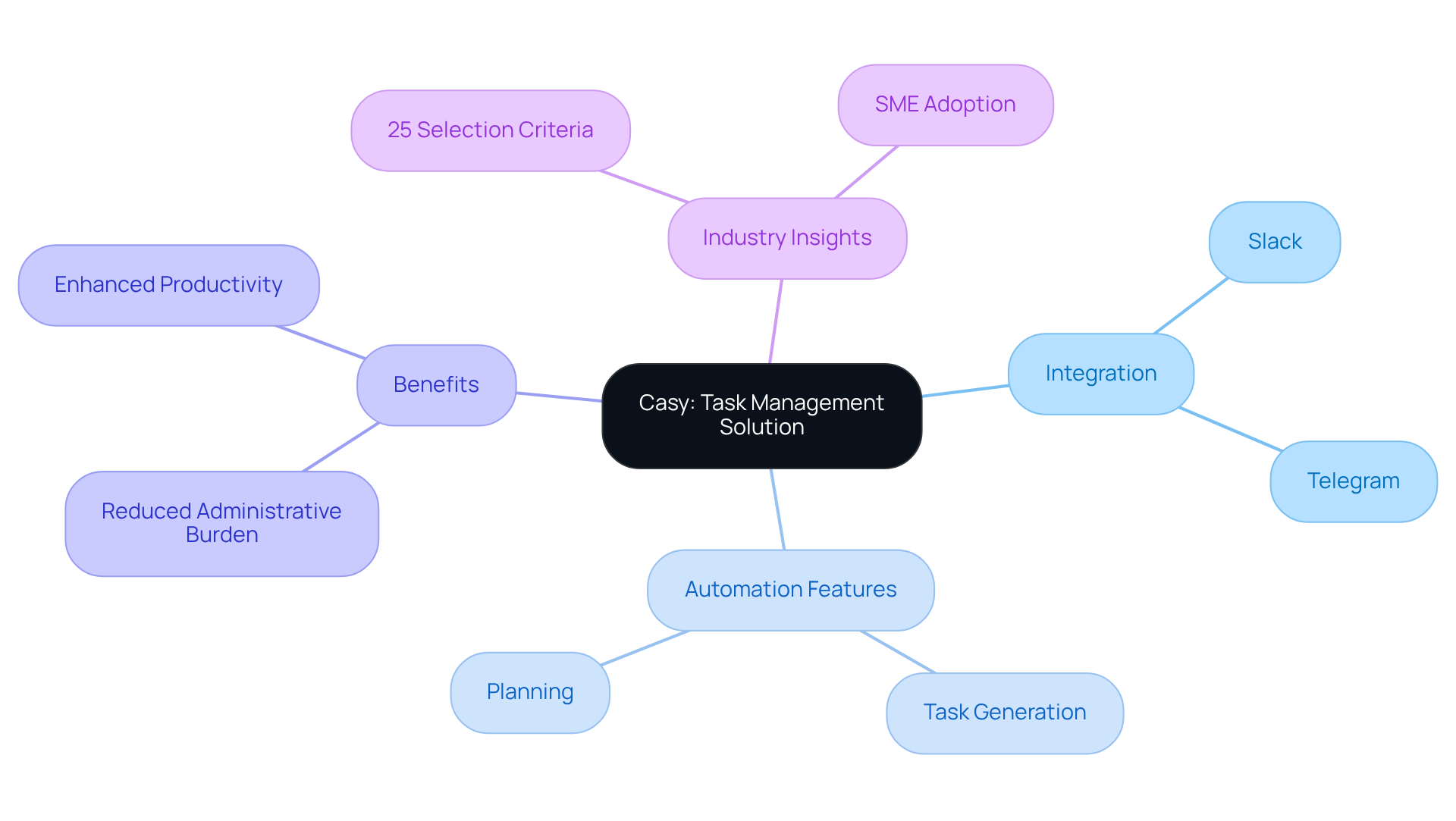
Asana: Streamline Team Collaboration and Task Tracking
Asana is an essential tool crafted to elevate group collaboration and streamline task tracking specifically for startups. Its intuitive interface empowers teams to seamlessly assign tasks, set deadlines, and monitor progress. With features like timelines and task dependencies, Asana provides a visual representation of workflows, ensuring that every team member remains aligned and accountable. This capability is especially beneficial for emerging businesses juggling multiple initiatives, as it fosters clear communication and significantly enhances overall success rates.
In fact, research shows that program management tools can boost project success rates by 71%, while effective teamwork can elevate productivity by 50%. Thus, Asana is an invaluable asset among program management tools for startups striving to optimize their operations and drive growth.
However, it is crucial to recognize that 43% of IT leaders perceive online collaboration tools as a security risk, underscoring the necessity for startups to prioritize data security while effectively utilizing such tools.
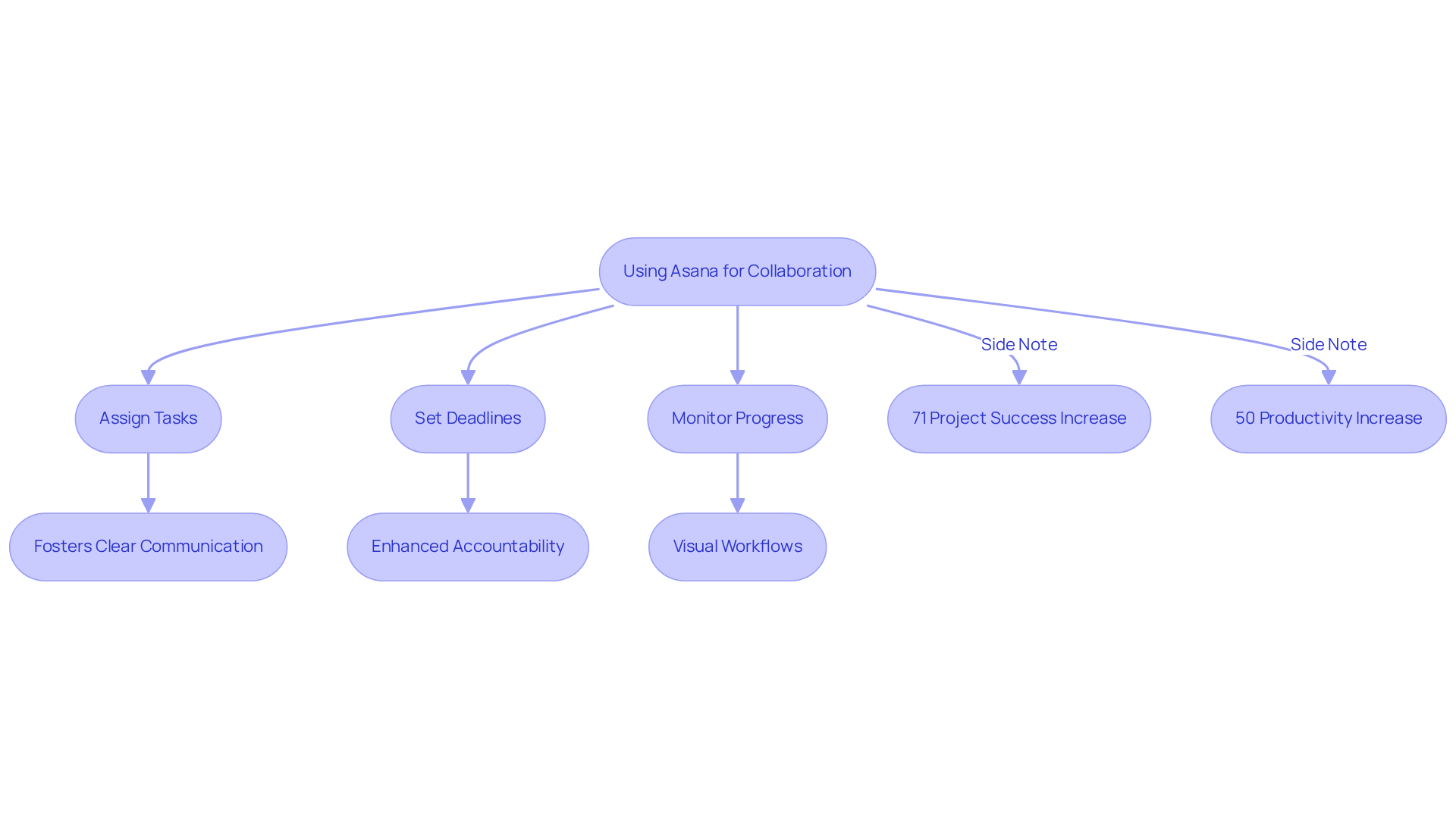
Trello: Visualize Projects with Kanban Boards
Trello employs a Kanban board framework that empowers teams to visualize their assignments and tasks with ease. Each task is represented as a card, which can be moved through various stages of completion, providing a clear overview of progress. This visual approach enables teams to swiftly identify bottlenecks and prioritize tasks effectively, ultimately enhancing productivity. Startups, in particular, reap significant benefits from Trello's flexibility, as it serves as a straightforward yet robust program management tool for managing workflows.
Recent updates, such as the Personal Productivity feature, significantly enhance task capture and organization. Additionally, integration with Google Calendar allows users to schedule tasks seamlessly. Have you considered how these features could streamline your operations? Furthermore, Trello's AI functionalities, including the Quick Capture feature, assist in extracting due dates and action items from messages, further optimizing task coordination.
With extensive integration options and a user-friendly interface, Trello stands out as an ideal choice for remote teams and startups striving to foster an environment conducive to innovation and growth. Are you ready to elevate your project management experience with Trello?
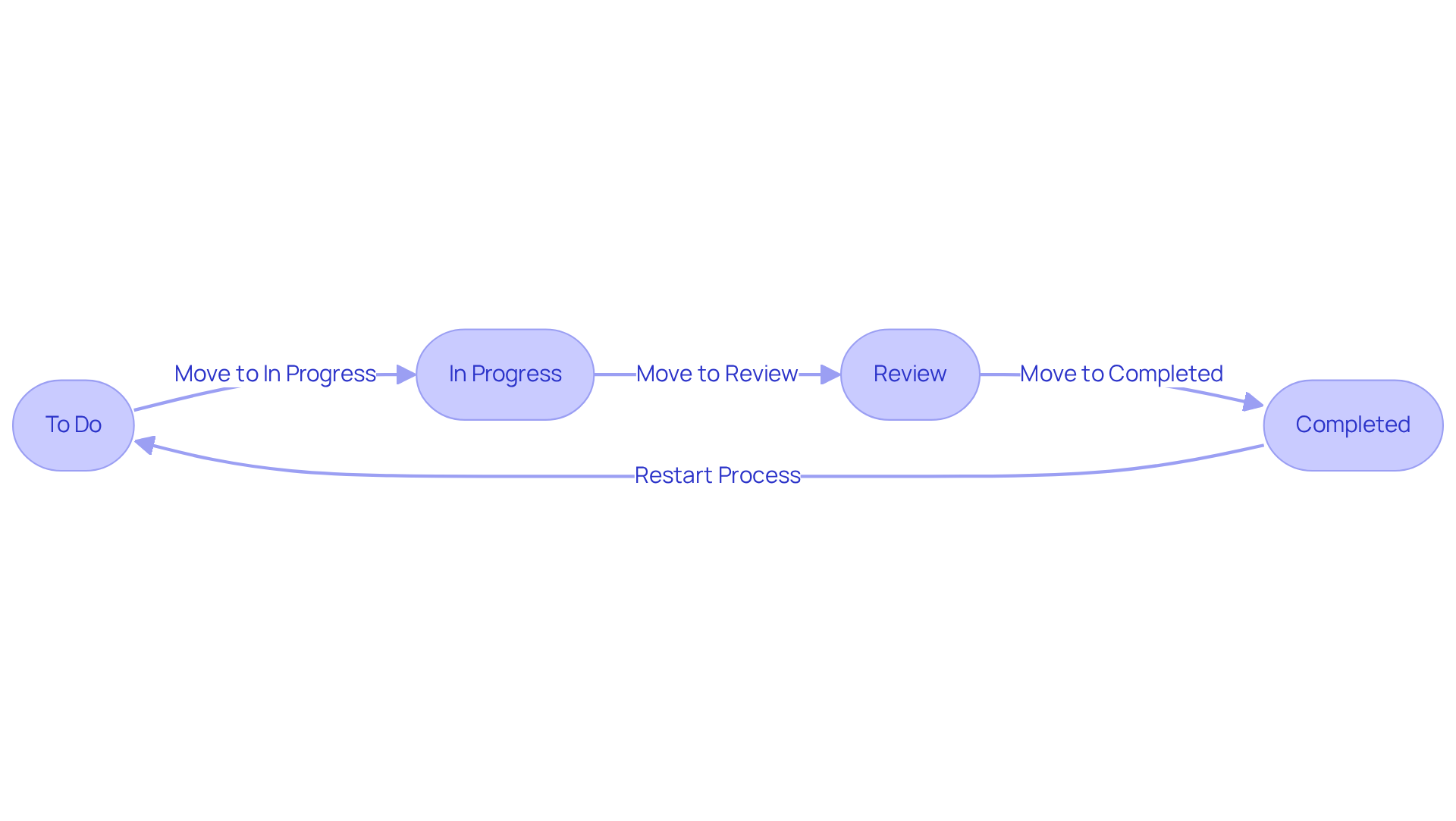
Monday.com: Customize Workflows for Enhanced Flexibility
Monday.com serves as a highly adaptable platform for program management tools, empowering teams to establish workflows tailored to their specific requirements. With features such as drag-and-drop functionality and customizable dashboards, teams can effortlessly modify the tool to align with their processes. This flexibility proves particularly advantageous for startups that may need to pivot swiftly, necessitating program management tools that can evolve alongside their needs.
Are you ready to transform your workflow? Consider how Monday.com's features can enhance your team's efficiency and responsiveness. By integrating this platform, you position your startup to navigate challenges with agility, ensuring that your program management tools are effective as your business grows.
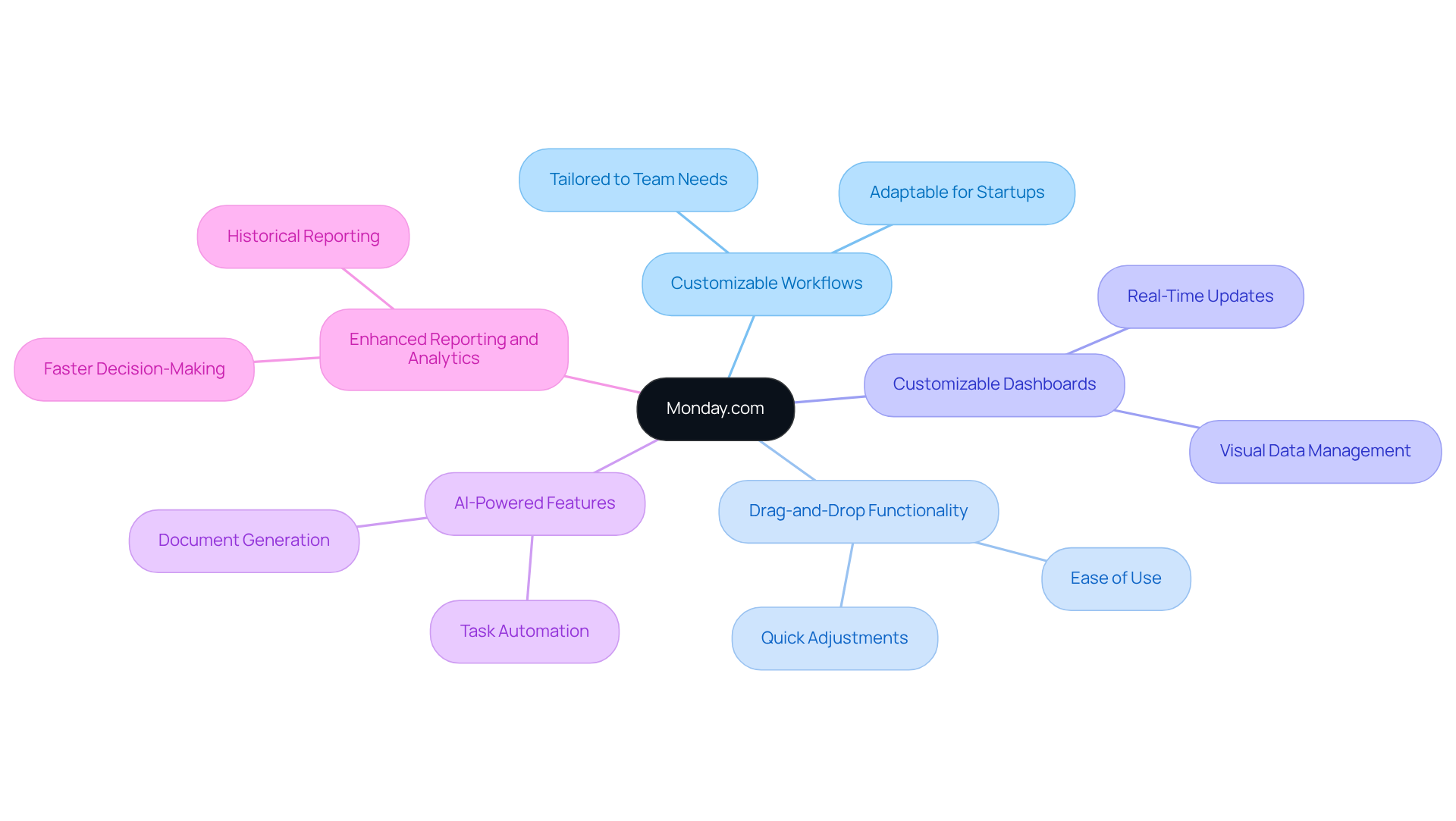
Wrike: Gain Insight with Gantt Charts and Time Tracking
Wrike offers robust Gantt charts that empower teams to visualize timelines and dependencies with precision. This feature, paired with advanced time tracking capabilities, equips teams with critical insights into resource allocation and identifies areas for improvement. With 2.4 million users, Wrike is an ideal solution for startups seeking to maintain stringent control over timelines and ensure tasks are completed punctually. The platform's new scheduling functionalities, including a comprehensive date selector available in all Table views, significantly enhance management capabilities.
Moreover, Wrike's mobile application allows teams to manage timesheet approvals on the go, thereby boosting flexibility and efficiency. The customizable dashboard feature presents key metrics immediately upon opening the application, underscoring Wrike's user-friendly interface. By leveraging Wrike's time tracking, teams can monitor the time dedicated to various tasks, optimizing productivity and enhancing completion rates. This dual functionality not only streamlines operations but also fosters informed decision-making, establishing Wrike as an indispensable program management tool for new businesses aiming to maximize efficiency and drive success.
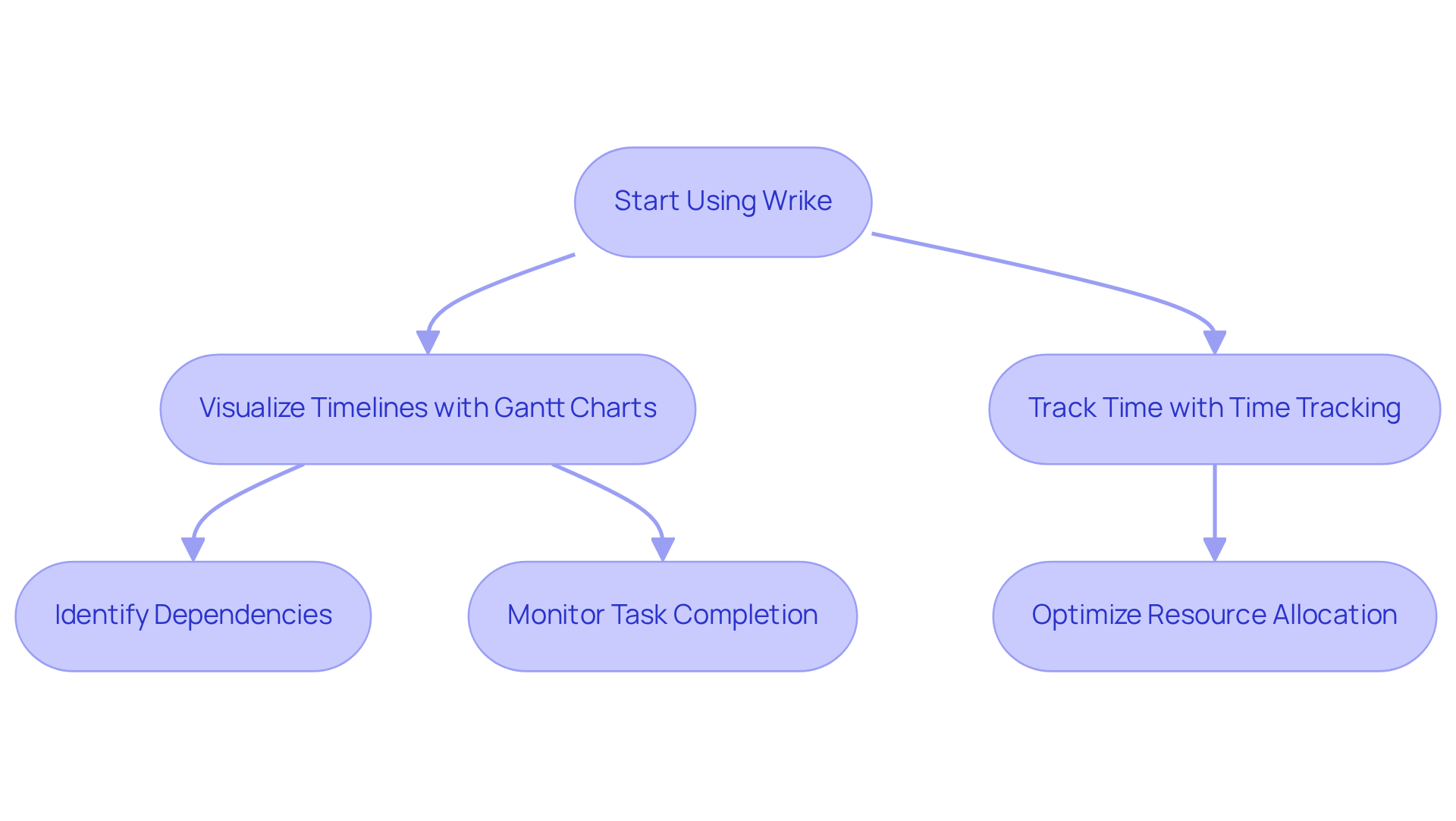
Basecamp: Simplify Project Management with User-Friendly Features
Basecamp is expertly designed to simplify task coordination through its user-friendly features, establishing itself as an ideal option for startups. With integrated to-do lists, message boards, and file sharing capabilities, it centralizes all project-related activities within one accessible platform. This straightforward design empowers teams to concentrate on their tasks, free from the distractions of unnecessarily complicated tools. By streamlining task oversight, Basecamp enhances group communication and collaboration, ultimately driving productivity.
Startups significantly benefit from its intuitive interface, which facilitates rapid onboarding and effective task coordination, ensuring teams can swiftly adapt to evolving requirements. As David Miller, an expert author at ProProfs, asserts, "Startup initiative coordination becomes easier once you have defined your organization’s purpose and established a thoroughly analyzed execution plan in motion." This statement underscores the critical importance of simplicity in managing initiatives for new businesses striving for success.
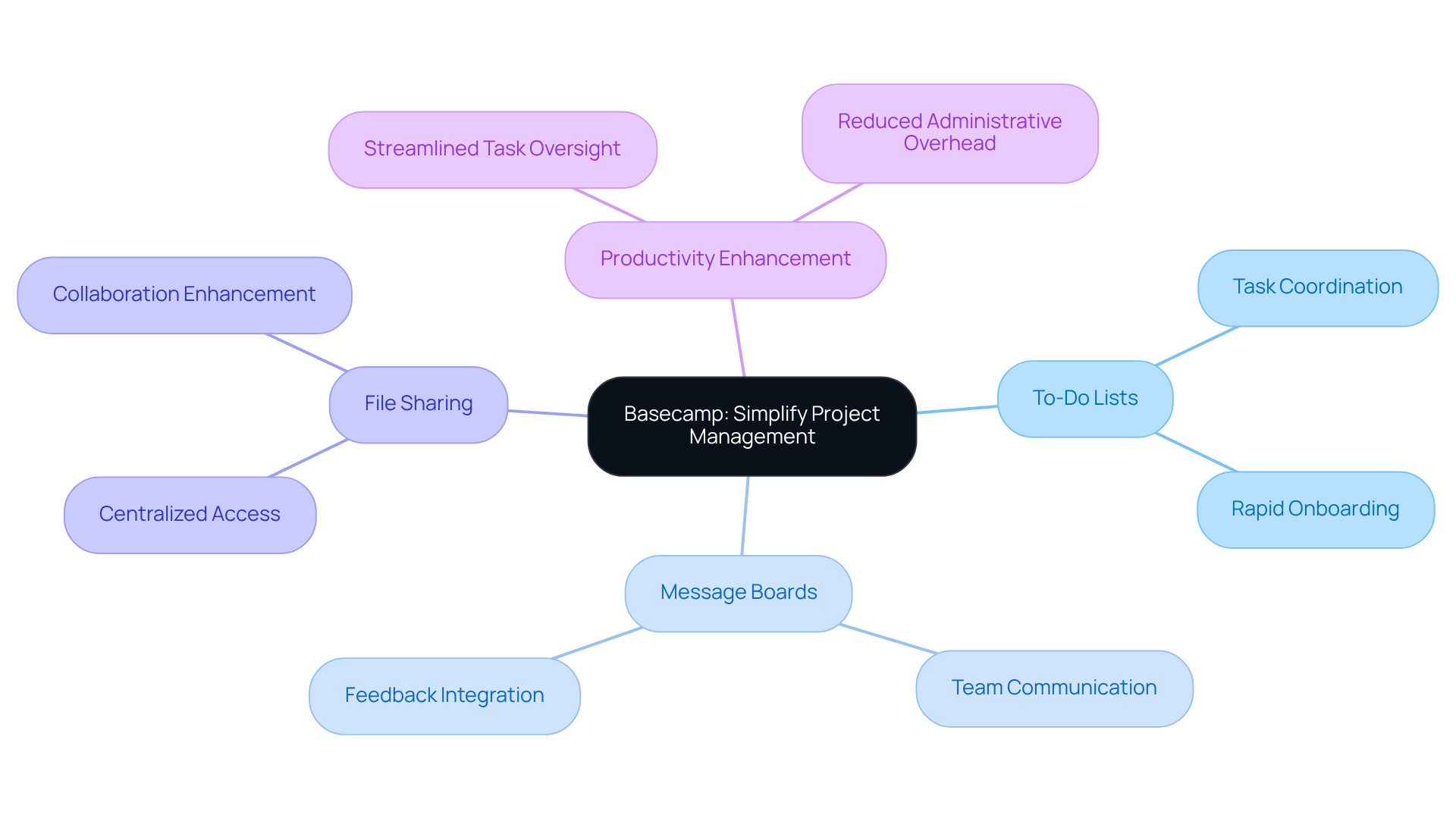
ClickUp: All-in-One Project Management Solution
ClickUp serves as a powerful all-in-one management solution, seamlessly integrating task oversight, document collaboration, and goal tracking within a single platform. This versatility empowers new businesses to customize their workflows and incorporate various tools, ensuring they have a comprehensive solution for efficiently managing their projects. With features such as Gantt charts, Kanban boards, and an AI Notetaker for meeting transcriptions, ClickUp significantly enhances organizational efficiency, allowing teams to focus on strategic objectives.
But how can automation and real-time collaboration transform your startup's success? The platform's ability to automate routine tasks and facilitate immediate collaboration allows teams to prioritize high-impact work and optimize operations. As project-focused industries are projected to reach a staggering GDP of $34.5 trillion by 2030, leveraging such robust tools is not just beneficial; it is essential for startups striving to thrive in a competitive landscape.
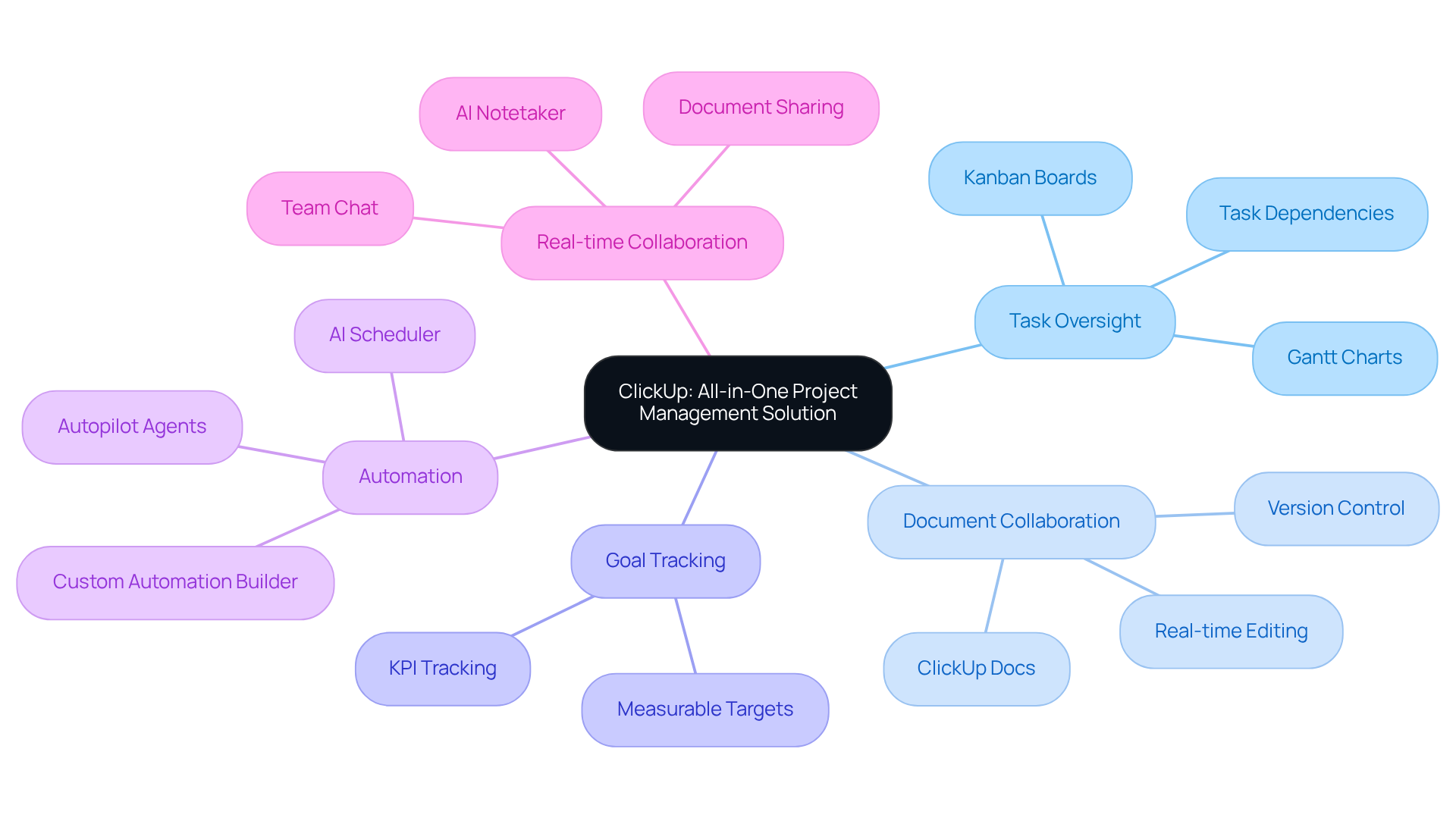
Notion: Build Custom Project Management Systems
Notion serves as a remarkably flexible platform, empowering groups to craft personalized program management tools that are tailored to their unique workflows. Teams can establish a workspace that aligns perfectly with their operational requirements using program management tools such as:
- databases
- kanban boards
- collaborative documents
This adaptability proves especially advantageous for new businesses, which often require agile solutions to manage tasks effectively and enhance collaboration among team members. In fact, organizations that prioritize adaptability in their task coordination tools report improved team collaboration and initiative outcomes. As highlighted by industry experts, the ability to customize workflows not only fosters a more engaged work environment but also significantly boosts productivity, positioning Notion as an exceptional choice for startups aiming to optimize their operations.
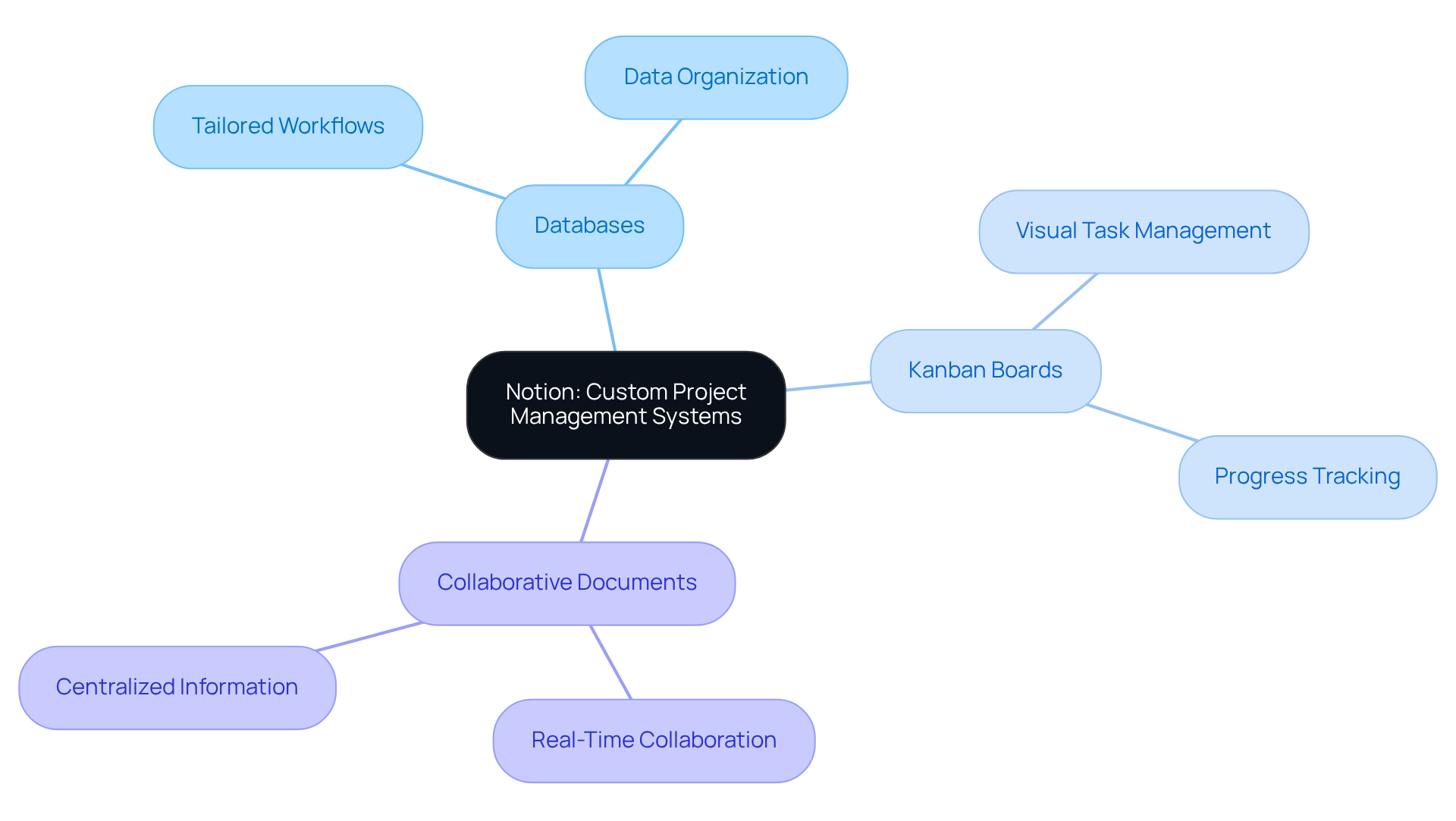
Smartsheet: Leverage Spreadsheet Functionality for Project Management
Smartsheet seamlessly merges the familiarity of spreadsheets with robust organizational features, positioning itself as an ideal choice for startups transitioning from traditional methods. With tools such as Gantt charts for visual timelines, resource allocation features to optimize team performance, and automated workflows that reduce manual tasks, Smartsheet empowers teams to enhance collaboration and effectively monitor progress.
Notably, 92% of PPM experts find it challenging to adapt to workplace changes, highlighting the critical need for efficient program management tools. As Pratima Arora, Chief Product Officer at Smartsheet, asserts, "Smartsheet is rethinking how work flows — across teams, tools, and time zones — to help people move faster, think more strategically, and do their best work."
This transformation not only simplifies task oversight but also significantly boosts tracking efficiency, allowing new ventures to focus on innovation and growth while ensuring clarity and control over their initiatives.
Furthermore, exploring tools like Casy, which automates workflows through integration with chat platforms, can offer startups alternative solutions to enhance productivity.
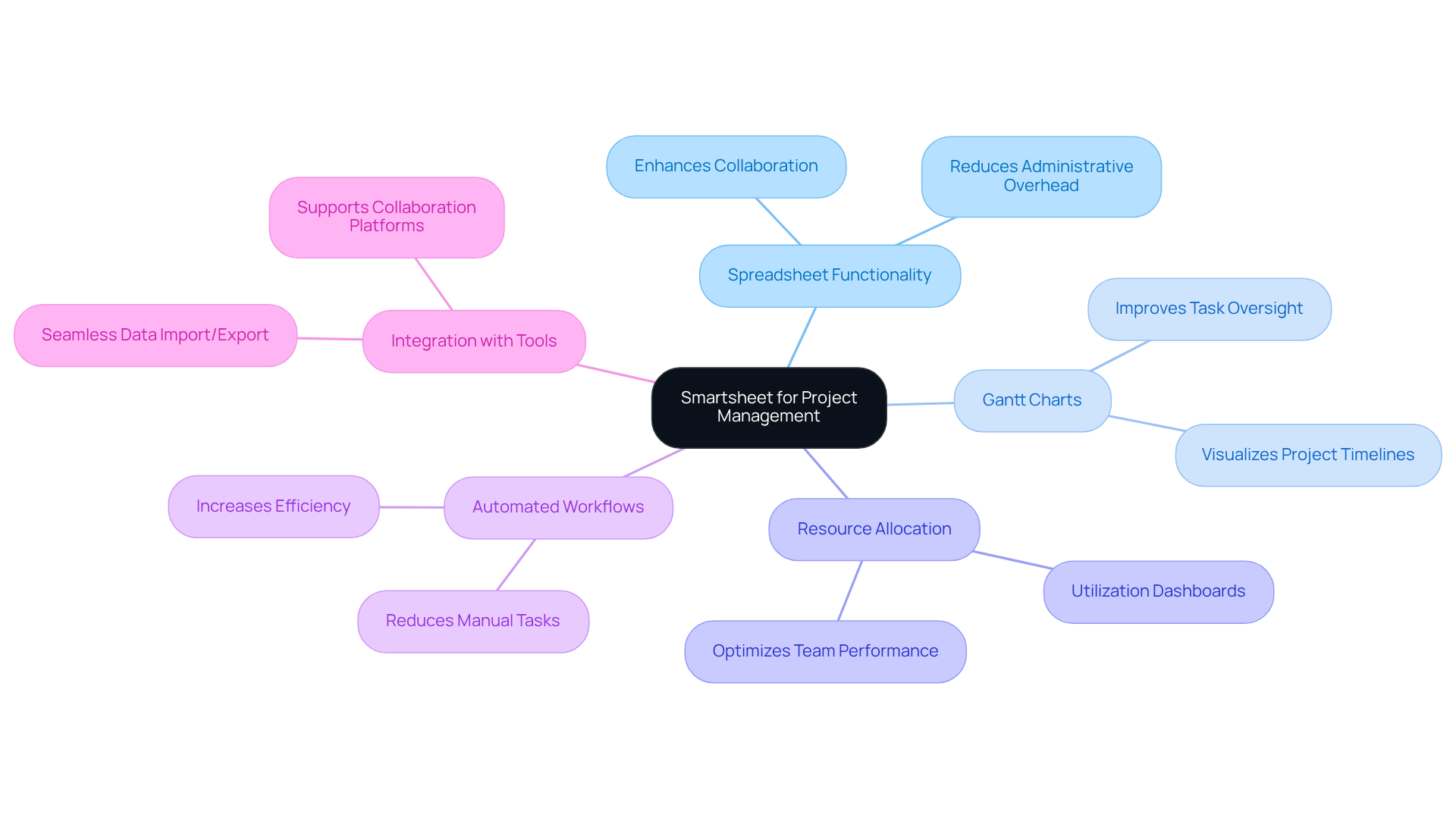
Teamwork: Manage Client Projects with Time Tracking and Billing
Teamwork serves as a powerful program management tool tailored for client-focused tasks, seamlessly integrating time tracking, billing, and management within a single platform. This comprehensive approach empowers teams to efficiently tackle client assignments, guaranteeing accurate time tracking and smooth invoice generation. For startups navigating multiple initiatives, Teamwork's features are indispensable for nurturing strong client relationships and delivering timely results.
The significance of effective time tracking in the success of program management tools for client projects cannot be overstated. By meticulously documenting hours worked, teams can provide transparent billing, fostering trust and satisfaction among clients. Furthermore, the capability to generate invoices directly from tracked time streamlines the billing process, minimizing administrative burdens and enabling teams to concentrate on their core activities. The introduction of the Invoice Status Report creates a centralized hub for monitoring and managing all invoices, thereby enhancing financial oversight.
Startups particularly benefit from Teamwork's time tracking and billing features. The platform allows users to monitor progress in real-time, ensuring efficient resource allocation. Additionally, the Placeholders feature enables teams to plan work without pre-assigning specific individuals, which proves especially advantageous for effective resource management.
By leveraging program management tools, startups can optimize their operations, ensuring they not only meet client expectations but also enhance their internal processes. As Jordan Wellin, Product Marketing Manager at Teamwork.com, remarked, "This enhancement puts the power in your hands to share updates with your clients when and how you want." Effective time monitoring is pivotal for management success, as it directly influences client satisfaction and profitability. With Teamwork, startups can harness the power of integrated time tracking and billing, propelling their projects forward with confidence.
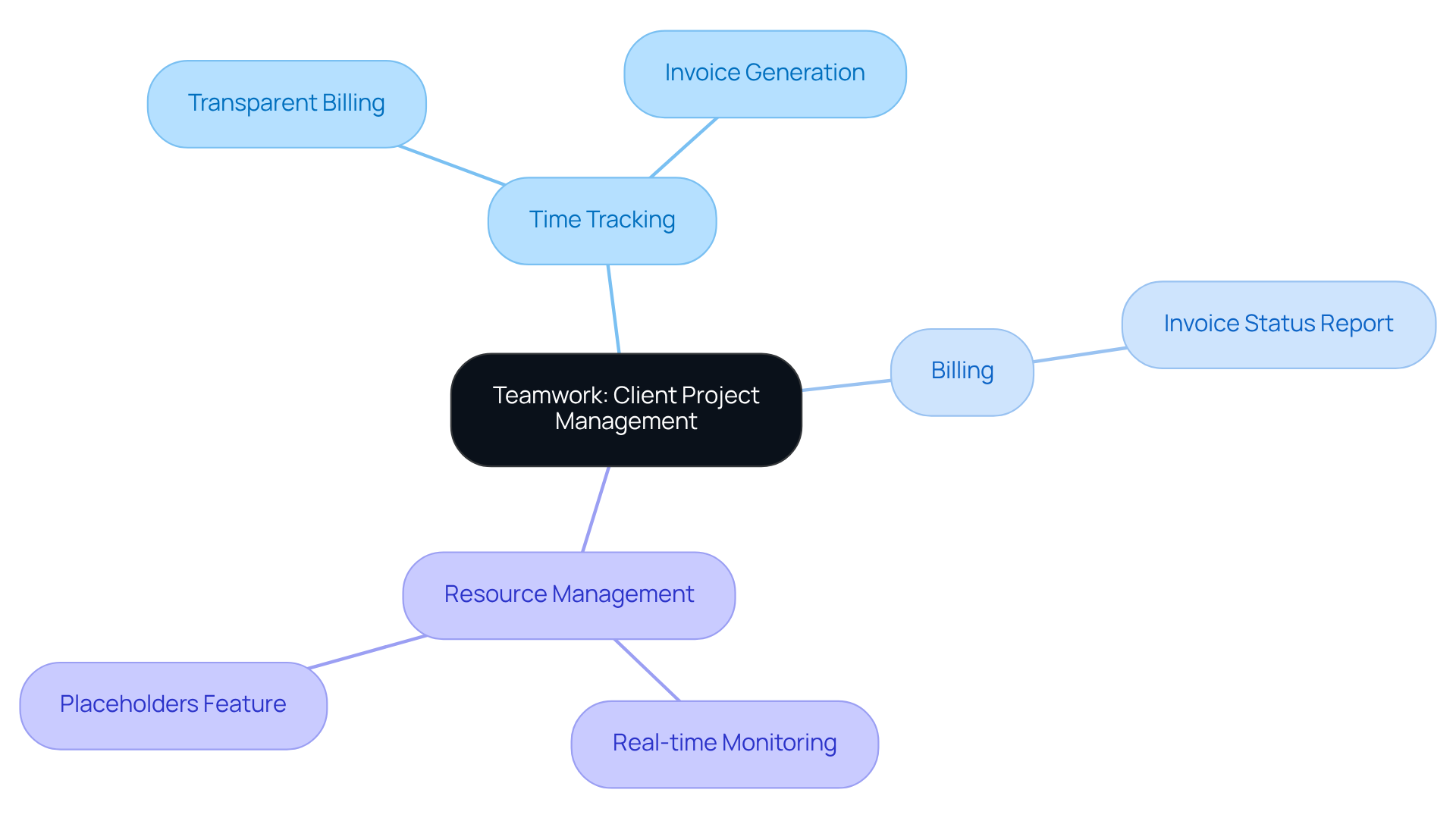
Conclusion
The exploration of program management tools underscores their critical role in streamlining operations for startups in 2025. These tools are not just enhancements; they are essential components that empower teams to optimize workflows, improve collaboration, and ultimately drive success. By leveraging the capabilities of platforms like Casy, Asana, Trello, and others, startups can transform their approach to project management, allowing them to focus on innovation and growth.
Throughout this article, key insights into each tool's unique features illustrate how they cater to the diverse needs of startups.
- Casy's automation capabilities
- Asana's collaborative functionalities
- Trello's visual task management
- Monday.com's customizable workflows
All contribute to a more efficient operational framework. Furthermore, tools like Wrike and ClickUp provide critical insights through advanced tracking and reporting features, while Basecamp and Smartsheet simplify project coordination with user-friendly designs. Each tool offers distinct advantages that collectively enhance productivity and team dynamics.
The significance of adopting effective program management tools cannot be overstated, particularly as startups navigate a competitive landscape. Prioritizing these tools not only fosters better internal processes but also strengthens client relationships through improved transparency and responsiveness. As startups continue to evolve, embracing these innovative solutions will be crucial for achieving operational excellence and sustaining growth. The future of successful project management lies in the hands of those who leverage these powerful tools to unlock their team's full potential.
Frequently Asked Questions
What is Casy and how does it enhance productivity?
Casy is a task management solution that integrates with chat platforms like Slack and Telegram. It automatically captures information from conversations, transforming discussions into actionable tasks, establishing deadlines, and updating documents without manual input, thus reducing administrative burdens and enhancing productivity.
Who can benefit from using Casy?
Startups and agile teams can benefit significantly from Casy's features, such as automated task generation and planning, allowing them to operate effectively without the challenges of traditional oversight tools.
What role does task automation play in selecting management software?
Task automation functionality constitutes 25% of the selection criteria weight when choosing task management software, highlighting its importance in contemporary workflows.
What are the benefits of using Asana for startups?
Asana enhances group collaboration and streamlines task tracking by allowing teams to assign tasks, set deadlines, and monitor progress. Its features, like timelines and task dependencies, help ensure alignment and accountability among team members.
How does Asana impact project success rates?
Research indicates that program management tools like Asana can boost project success rates by 71%, while effective teamwork can elevate productivity by 50%.
What security concerns are associated with online collaboration tools like Asana?
43% of IT leaders perceive online collaboration tools as a security risk, emphasizing the need for startups to prioritize data security while using such tools.
What is Trello and how does it support project management?
Trello is a project management tool that uses a Kanban board framework, allowing teams to visualize tasks as cards that move through various stages. This visual approach helps identify bottlenecks and prioritize tasks effectively.
What recent features have been added to Trello?
Recent updates to Trello include the Personal Productivity feature for better task capture and organization and integration with Google Calendar for seamless task scheduling.
How does Trello's AI functionality assist users?
Trello's AI functionalities, such as the Quick Capture feature, help extract due dates and action items from messages, optimizing task coordination.
Why is Trello a good choice for remote teams and startups?
Trello's extensive integration options and user-friendly interface make it an ideal choice for remote teams and startups looking to foster an innovative and growth-oriented environment.




